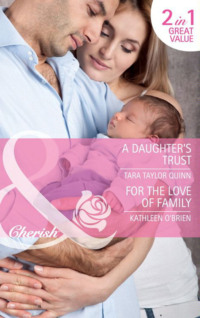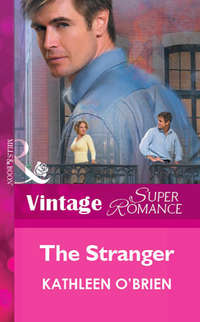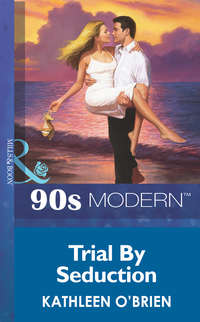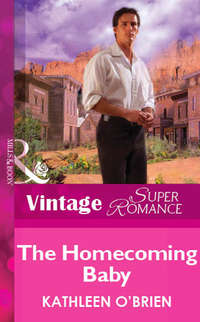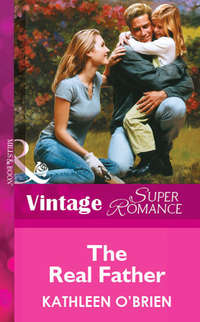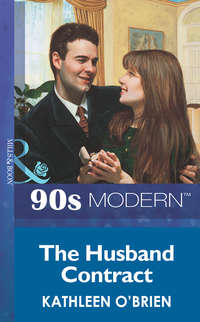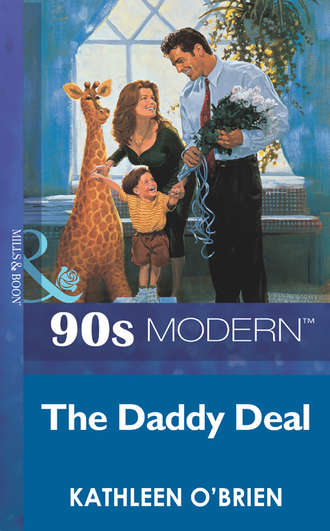
Полная версия
The Daddy Deal

“It’s time to make a deal.” About the Author Books by Kathleen O’Brien Title Page Dedication CHAPTER ONE CHAPTER TWO CHAPTER THREE CHAPTER FOUR CHAPTER FIVE CHAPTER SIX CHAPTER SEVEN CHAPTER EIGHT CHAPTER NINE CHAPTER TEN CHAPTER ELEVEN Copyright
“It’s time to make a deal.”
Taylor continued. “An alliance, a partnership for the purpose of forming a family. Neither one of us can live with a joint-custody arrangement. Still, Justin must have a father and a mother.... So I’m suggesting that we take on the job together.”
“Do you mean....” Brooke opened her mouth, but nothing more would come out.
“Yes, this is a prenuptial agreement. I’m asking you to marry me.”
“I don’t know. I—I guess I always thought I would marry for love.”
His gaze was dark, hooded. “Well, isn’t that what we would be doing? We both love Justin, don’t we?”
FROM HERE TO PATERNITY—romances that feature fantastic men who eventually make fabulous fathers. Some seek paternity, some have it thrust upon them, all will make it—whether they like it, or not!
KATHLEEN O’BRIEN, who lives in Florida, started out as a newspaper feature writer, but after marriage and motherhood, she traded that in to work on a novel. She writes with intensity and emotional depth, and we know you’ll be gripped by her latest book, The Daddy Deal—it will make you laugh, make you cry, and you won’t want it to end!
Books by Kathleen O’Brien
HARLEQUIN PRESENTS
1267—DREAMS ON FIRE
1355—BARGAIN WITH THE WIND
1515—BETWEEN MIST AND MIDNIGHT
1600—WHEN DRAGONS DREAM
1642—A FORGOTTEN MAGIC
1698—MICHAEL’S SILENCE
1853—MISTLETOE MAN
Don’t miss any of our special offers. Write to us at the following address for information on our newest releases.
Harlequin Reader Service
U.S.: 3010 Walden Ave., P.O. Box 1325, Buffalo. NY 14269
Canadian: P.O. Box 609, Fort Erie, Ont. L2A 5X3
The Daddy Deal
Kathleen O'Brien

www.millsandboon.co.uk
To Celie.
Thanks for the wings of your laughter,
the ballast of your wisdom.
And, most of all, for the friendship of a lifetime.
CHAPTER ONE
TAYLOR PRYCE cursed under his breath as he watched the freckled kid on the swing. Didn’t public playgrounds have any supervision? If that kid didn’t slow down, he was going to crack his head open like a watermelon.
Hooking his hands through the openings on the chainlink fence, Taylor fought the urge to yell at the boy, who was about five years old and, if he didn’t stop trying to turn himself upside down on that swing, probably wouldn’t live to be six.
But Taylor managed to control himself. It wasn’t his problem. The kid’s mother was sitting just ten feet away, placidly gossiping with the other moms. She clearly wasn’t worried about how centrifugal force worked, or about concussions and busted skulls. Taylor turned around, unable to bear the gut-twisting suspense of watching the swing lurch higher and higher. It wasn’t, he repeated to himself, his problem.
He adjusted the knot on his tie uncomfortably. God, it was going to be a hot day. Checking his watch, he cast a scowling gaze around the park, which was already crowded on this steamy June morning. Kids everywhere. Mothers and infants, fathers and sons, balls and Frisbees and jump ropes. Didn’t anyone have to work on a midweek morning anymore? Was everyone in Florida a tourist? And where the devil was McAllister?
The kids on the playground behind him were really turning up the volume, squealing and hollering at one another like wild animals. Again he controlled the urge to turn around and check on the preschool daredevil. It was ridiculous. When had Taylor Pryce, thirty-year-old professional bachelor, developed this sudden fidgety paternal streak?
But, of course, he knew when it had happened—he knew to the day, to the minute. It happened more than a year ago, when he had read an old love letter addressed to his dead brother, a letter that spoke of a baby on the way.
Somehow, ever since that moment, while his lawyers combed the country, searching for that baby, Taylor’s subconscious had been training him, getting him ready to be a father.
A father. He shut his eyes against the bright morning sun. God, that sounded strange. Until the letter had surfaced, he hadn’t even known he was an uncle. But the letter left no room for doubt. Jimmy, who died two years ago in some crazy, war-torn European country Taylor had hardly known existed, had left behind a child, a little boy, now almost two years old. A boy who should bear the Pryce name—but didn’t. A boy who had been... Taylor clenched his teeth. There was only one word for it. Stolen. His nephew had been stolen.
Taylor jerked his tie down an inch and pried his top button loose. It must be a hundred degrees out here. Where the hell was Charlie?
But just as Taylor pulled his keys out of his pocket, ready to head back to his car, Charlie McAllister’s pudgy, sweat-drenched face jogged into sight.
“It’s about time,” Taylor said as Charlie plopped on the bench in front of him, wiping his gleaming face with his terry wristband. “Weren’t we supposed to meet at eight?”
Charlie leaned his head back, dramatically out of breath. “Yeah, well, I don’t run as fast as I used to.” He mopped the sweat from his neck and arms. “And you don’t run at all; you lazy son of a gun. How the hell do you stay so fit?”
Taylor just raised his eyebrows—they’d been through this before, and Charlie knew full well that it had something to do with the half-dozen doughnuts he’d scarfed down before his run this morning. Besides, they hadn’t met out here to discuss exercise programs. Propping one foot up on the bench beside his friend, Taylor rotated his shoulders slightly, stretching out the tension while he waited for Charlie’s heaving chest to slow down.
His patience gave out quickly. Charlie was stalling, and that was a bad sign. “Well?”
Charlie hung his short white towel over his neck and gave Taylor a sorrowful look. “Nothing,” he said mournfully. “Zilch.”
“Nothing?” Taylor didn’t ordinarily waste time repeating the obvious, but he could hardly believe his ears. “Nothing?”
Charlie shrugged. “Well, nothing you can use anyway. Nothing that would seriously impeach her character, or the adoption itself. Apparently, Brooke Davenport adopted Justin in good faith—”
“Good faith?” Taylor leaned over and jammed his forefinger against his thigh angrily. “With my name forged on those adoption papers?”
“We’ve only your word for that, Taylor.” Before Taylor could let loose the oath that rose in his throat, Charlie put up a placating hand. “And don’t scowl at me like that. You know what I mean. I’m talking as your lawyer now, and legally it’s your word against theirs. It’s a damned good forgery—even the experts we hired can’t agree whether it’s a fake.”
“It is.” Taylor’s lips were tight, and the words sounded like a hiss.
“Well, we’re going to have to prove that beyond a shadow of a doubt if we expect a judge to take Justin away from the only family he’s ever known.” Charlie met Taylor’s gaze steadily. “Away from what is, by all accounts, a damn good mother.”
Taylor narrowed his eyes. “Tell me.”
“Okay, but it’s really just a bunch of negatives.” Charlie took another unnecessary swipe at his upper lip with the towel. “No record, except for a couple of parking tickets. No drugs, no alcohol, no wild nights at the local saloon.”
“Boyfriends?”
Charlie shook his head. “Nope. She spends all day with Justin. She works in her garden. Grows a lot of roses. Then at night, she’s still working as a nurse, mostly nights, mostly private duty. Not much time for a love life, actually.”
“Who’s home with Justin all night, then?”
“A nurse friend of hers, older lady.”
“What about her?” Taylor knew he was grasping at straws, but damn it, there just had to be some chink in Brooke Davenport’s armor. “Any chance this other woman isn’t fit....?”
Charlie smiled, obviously following Taylor’s line of desperation logic. “You mean is there any chance the old lady is really Ma Barker? Any chance she slips out at night to rob convenience stores, leaving Justin all alone in his crib?” He shook his head. “Sorry. We’ve already checked her out. She’s just a nice, semiretired nurse who rents a room from Brooke in return for a little baby-sitting.”
Taylor expelled a frustrated breath and pulled on his left earlobe. “God, Charlie—”
“I know.” Charlie’s eyes were sympathetic, though his tone was determinedly light. “All the wickedness in this heathen world, and we have to stumble into a nest of saints.”
Taylor frowned. Something about all this didn’t make sense. “There aren’t very many single, twenty-six-year-old female saints around today, Charlie. Why no boyfriends? Is she hideous?”
“Hardly!” Charlie laughed as if the word were a joke, and Taylor wondered just how attractive Brooke Davenport really was. He should have asked to see a picture of her. Though he was considered a tough and astute lawyer, Charlie McAllister was a notorious pushover for a pretty lady, and Taylor had noticed a definite softening in Charlie’s attitude toward the whole situation since they had finally located Justin and his adoptive mother.
“So why no men in her life? Surely that’s odd in itself.”
“No, no.” Charlie seemed irritable, as if he resented Taylor’s implications. “There’ve been men, naturally. She was engaged a couple of years ago to a lawyer named Westover. I checked him, too. Good-looking guy, but word is he’s a little short on ethics. Anyway, he didn’t approve of the adoption, didn’t want to be saddled with a damaged kid, I guess, so the relationship went sour.”
“Still—”
“And, of course, there was the teenage fiasco—” Charlie stopped himself abruptly, as if he had said something he hadn’t meant to say. He fussed with the laces on his jogging shoes. “Anyway, as I said, for our purposes there’s nothing. She’s normal, but temporarily celibate. She’s not a saint, I guess, but she’s darn close.”
But Taylor wasn’t so easily distracted. He straightened slowly. “What teenage fiasco?”
Charlie frowned. “Ancient history,” he equivocated, moving to his other shoe, grunting as he bent over farther than his paunch wanted to let him. “Irrelevant.”
Taylor frowned, too, glaring down at Charlie’s bald spot, which was pink with incipient sunburn. “Whose side are you on here, Charlie?” His voice was hard, even harder than he had intended it to be, and he took a deep breath of muggy air. This thing was really getting to him.
Charlie stopped pretending interest in the shoes. “Yours,” he said calmly, meeting Taylor’s eyes with the same guileless brown gaze Taylor remembered from childhood, the same straightforward honesty that had made Charlie the undisputed referee of all their crowd’s boyhood arguments. “Yours. You know that.”
“Then why are you holding back on me? If you’ve found out something we can use—”
“I haven’t.” Charlie leaned back with a sigh, wadding his towel up and tossing it roughly onto the bench beside him. “Look, Taylor, I’m telling you it’s old news. Ten years old, in fact. When Brooke Davenport was sixteen, she got pregnant. The boyfriend was only a little older—eighteen, I think. Parental apoplexy all around, as you can imagine. Turned out to be an ectopic pregnancy, though, and the poor kid damn near died of it. Lost the baby, of course, and it messed her up so badly there probably won’t be any more pregnancies, planned or otherwise.”
Taylor could hear the edge that had crept into Charlie’s voice, an edge of pity for Brooke Davenport and irritation toward Taylor for pushing the issue. But though he knew it was a sad story, and his heart tightened in spite of himself, Taylor wouldn’t allow himself to lose sight of the main point.
“Well, I’m sorry she can’t have kids, but that doesn’t give her the right to steal someone else’s child, does it?”
Charlie’s eyes hardened, and suddenly he looked more like the tough opponent other lawyers met in court. “Listen here, Taylor—”
But Taylor ignored the dangerous flash in his friend’s eyes. He had a feeling his own eyes looked pretty dangerous right now, too.
“And besides,” he went on ruthlessly, “who says we can’t use the information? Maybe she’s developed an obsession. Maybe being sterile has given her a fixation about adopting, so that she’d do anything to get a baby, even forge my name to those papers. If that could be proved—”
Charlie cursed, an expression of frustration he rarely allowed himself. “God, Taylor, do you hear yourself?”
“What? I’m just being practical. This is no time to get squeamish, Char—”
Before Taylor could finish, a clamor broke out on the playground behind them. Someone was hurt. Above the scuffling of bodies and the confused tumult of voices, Taylor could hear the wailing of a child in pain. He spun around, a foreboding settling in his gut. And he was right—the swing was empty now, twisting crazily back and forth. The freckled little boy was finally on the ground, screaming in fear as his mother knelt next to him, trying to inspect the rapidly reddening scrapes on his cheeks, hands and knees.
Taylor watched the woman fold the kid in her arms, comforting and scolding all at once. Damn! He had known it was going to happen. He should have said something—he should have done something. But he hadn’t had the right to get involved. The child wasn’t his.
He tried to hold back the sense of impotence that threatened to overwhelm him. Somewhere in this town, his brother’s child might be in need, too, and Taylor had no right to get involved in that, either. He cursed under his breath. It was unendurable.
He wheeled back toward Charlie. “I’m going to get him,” he said, his voice sounding as if it had been scoured with sandpaper. “I don’t care what you think. I don’t care what anybody thinks. That boy is my nephew. My flesh and blood. And, by God, I’m going to take him back from that woman if it’s the last thing I do.”
To his surprise, Charlie’s gaze was once again sympathetic, drifting from the scene on the playground to Taylor, then back to the crying boy again. Finally, he nodded. “Okay,” he said. “We’ll think of something.”
“I already have,” Taylor said curtly, pulling his pen out of the breast pocket of his jacket. “Give me the woman’s address.”
Charlie recoiled subtly, his eyes narrowing. “Why? I thought you didn’t want me to approach her. I thought you didn’t want me to let her know we were investigating.”
“I don’t.” Taylor held out the pen and a slim black notebook, pointing them at Charlie’s chest like weapons. “Just give me her address.”
The lawyer took the pen reluctantly. “What the devil are you planning?” He began, very slowly, to write, and Taylor waited silently while he scribbled a few words on the page.
Sighing deeply, he handed the notebook to Taylor, who gave it only one short glance before flipping it shut. One glance was all he needed. 909 Parker Lane—he’d remember that address until the day he died.
Turning his head away from Charlie’s disapproving frown, Taylor watched the little boy hobble off the playground, sobbing inconsolably into his mother’s skirt. He could feel Charlie standing behind him, his anxiety and annoyance almost as palpable as the heat around them.
“I asked you a question,” Charlie said slowly. “What are you planning to do?”
Taylor turned his head an inch. He could just see the other man out of the corner of his eye.
“Whatever it takes,” he said grimly, sliding the notebook back into his breast pocket. “Whatever it takes.”
Was it just that she was so tired, Brooke Davenport wondered, or was the Eberson Theater looking particularly surreal tonight?
Ordinarily, Brooke loved the exotic old movie palace, which dated from the Roaring Twenties. The auditorium walls were covered with sculpted facades to suggest an open-air Mediterranean courtyard; its ceiling was painted violet, like a twilight sky, and dotted with electric “stars”.
Tonight, though, as she followed Clarke Westover through the glittering throng of wealthy Floridians who had gathered to raise money for the theater’s ongoing restoration, Brooke suddenly found the atmosphere unnerving. She swept her tired gaze across the walls that climbed up toward the artificial twilight. Not one square inch had been left uncarved. Scrolls, vines, flowers, birds and cherubs all twisted together in nightmarish intimacies. It was almost suffocating.
Or perhaps the auditorium was just too crowded. She took a deep breath of the stuffy, overconditioned air and tried to ignore the champagne that splashed over her knuckles as yet another tuxedo bumped into her. The seats had been removed—the latest phase of the renovation—and replaced for the evening with a temporary floor and small wrought-iron tables and chairs. Brooke looked longingly at every empty chair they passed. She was so tired—she had barely slept for the past week. If only Clarke had agreed to meet her in his office. This whole ordeal could have been over by now.
Instead, it was just beginning. Climbing to the stage, the emcee tapped his microphone and announced that it was time to open the auction. An expectant murmur rode through the room like a wave, and the guests began gliding toward their seats, a psychedelic rainbow of silk swirling against a checkerboard of black-and-white tuxedos.
Brooke was just barely able to keep up with Clarke’s broad, black-clad back—he was moving fast, more accustomed than she to maneuvering through elegant party crushes. Without warning, the room dimmed as someone turned down the stars, and for a frightening second Brooke wondered if she were fainting.
“Clarke...”
She clutched at his hand for balance, a moment of weakness she regretted when she saw his surprised smile broaden into self-satisfaction. Ahhh, that smile said—now he had her precisely where he wanted her. After almost two years of keeping a strained distance, she had finally come crawling back to him, just as he had always predicted she would.
Except that it wasn’t true. When she had telephoned him this morning, she’d been scrupulously careful to explain that her call was strictly business. But she had known, from the minute he insisted on meeting her at this society function, that he was reading something more personal into it.
What a mess! She tried to extricate her hand unobtrusively, but his cold grip was proprietary and unyielding. Finally, just as she began to feel slightly claustrophobic, Clarke found the table assigned to them and pulled out her chair with a flourish.
She sat, her whole body sinking with relief, though the iron was stiff and unwelcoming. When Clarke draped his arm loosely around the back of her chair, Brooke pretended not to notice. She knew she had to tread very carefully. If she wounded his pride, he would find a way to make her pay.
Exhausted tears suddenly stung behind Brooke’s eyes. How high would the price be? Would he refuse to help her, to talk to Mr. Alston for her? Or would he go even further? He knew that Alston, the millionaire builder whose legal affairs he handled, was the one man in Tampa who actually desired Brooke’s little bungalow enough to pay three times its appraised value. Could Clarke possibly be capable of advising Mr. Alston not to buy?
“Seven hundred once, twice—” The gavel thumped, echoing in the microphone, and Brooke started slightly. “Sold to Mr. Westover, number twenty-three, for seven hundred dollars.”
She looked up, stunned. She hadn’t even realized that Clarke was bidding on anything, hadn’t, in truth, even realized the auction was under way. Seven hundred dollars? Good Lord, what was he buying? She glanced over at him, and even in the dim light she could see the flush of triumph on his features.
“Bastard thought he was going to take it away from me,” Clarke muttered to her out of the side of his mouth.
“Who?” She was confused, as if he were speaking a foreign language. “Take what away?”
“Number three-oh-four.” Clarke shifted his eyes subtly to the table on their immediate right, where a man sat, absently tapping his card on the arm of his chair while he chatted softly with a stunning brunette. “See him? Taylor Allen. Man’s a damn fool. It’s a good case of champagne, but not that good. It’s not worth more than six hundred.”
Brooke wasn’t sure which of the two men had been proved the bigger fool—Taylor What’s-his-name, who had lost the opportunity to overpay for the case of champagne, or Clarke, who seemed so smugly pleased to have done so—but she knew better than to voice any such thoughts. Clarke had caught Taylor’s eye, and the other man raised his glass with a small smile, as if saluting Clarke’s acumen. Clarke returned the gesture, bowing slightly, and Brooke inwardly flinched. Was she the only one who saw the mockery in Taylor’s eyes?
“Usher!” Clarke’s sudden whisper, spoken over his shoulder, was sharp and piercing. “We’ll have a bottle now.” The usher nodded and disappeared, and Clarke turned to Brooke. “To celebrate,” he said softly. “An important champagne for an important night.”
“Clarke...” She leaned forward, suddenly desperate to straighten things out now, before they went too far. “Clarke, I hope you understand that I just wanted to ask you—”
“Shhh...” The emcee had begun hawking a celebrity autograph. Clarke had returned his attention to the stage, though she could tell he was watching Taylor out of the corner of his eye, waiting to see whether the other man desired the item before he bid on it.
Clarke needn’t have bothered. Taylor couldn’t have been more disinterested. His brunette, whose preferred method of communication seemed to be through her fingertips, was talking to him, and their heads were bent together in a heart-shaped shadow. Brooke watched them for a moment, envying the brunette her utter sangfroid.
The woman was quite beautiful, and judging from the understated glamour of her dress, she had no money problems, no sick child at home. No, the brunette had nothing more troubling on her mind than whether she could make Taylor kiss her.
Even that didn’t seem to be much in question. As Brooke watched, too tired to subdue the demon of envy, the man smiled at some soft coquetry the brunette tossed his way. And what a smile... For a space no longer than the pulse of a heartbeat, something intensely female lurched inside Brooke, something warm and electric she hadn’t felt in years—something she certainly hadn’t expected to feel tonight.
The sensation disappeared as quickly as it came, though. Feeling foolish, Brooke averted her eyes and gulped down some of Clarke’s seven-hundred-dollar champagne, which the obedient usher had just poured into her glass.
She drank again, aware of growing slightly tipsy, blessedly numb. How depressing. How desperately depressing. It was proof of how exhausted she really was that, even after a glimpse of that smile, she still wanted more than anything to go home and sleep—alone—for a week.
Was she really a dried-up old woman at only twenty-six? Had the past two years of constant worry—worry about expensive doctors and painful operations and her little boy sobbing in bewildered pain—left her with a heart too withered to enjoy, even for a moment, a handsome man’s beautiful, sexy smile?
Finally, halfway through the second bottle, the auction was over. Though by now she could hardly feel her tongue, could hardly string her words together with anything approaching eloquence or diplomacy, she began trying to explain to Clarke why she had asked to see him.


